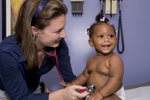|
|
|

|
MUSC receives grant to expand residency training
|
By
Cindy Abole
Public
Relations
MUSC’s Pediatric Residency Primary Care Track received a $1.92 million
grant in 2010, one of 30 primary care programs nationally, that is
aimed at reshaping the way pediatric care is handled.
The award will increase pediatric residency slots and strengthen
expertise in caring for the Tri-county’s youngest patients. The
five-year grant comes from the Health Resources and Services
Administration (HRSA) and is part of the agency’s primary care
residency expansion efforts. The award expands the current residency
positions to 16 spots—adding two pediatric primary care track positions
for the next five years.
 Dr. William Basco Dr. William Basco
William T. Basco, M.D., principal investigator of the grant, associate
professor and director of the Division of General Pediatrics, said the
grant allows MUSC to enhance and transform how the pediatric residency
primary track is organized. “We hope this change will help
resident-physicians see beyond the traditional general pediatric
residency track and change their mindset about how and where they can
accomplish some of their training.”
The grant boosts the Department of Pediatrics’ effort to prepare, train
and retain quality pediatricians by increasing time in community
practices in order to improve their skills in primary care and
community pediatrics. It provides participants with nine months of
additional training in a variety of community settings caring for the
Lowcountry’s infants, children, teens and young adults.
HRSA’s Public Health Service Act supports the Primary Care Residency
Expansion Program, which aims to increase the number of resident-
physicians in family medicine, general internal and general pediatric
medicine at accredited primary care residency programs throughout the
country.
 Pediatric resident
Dr. Abby Schuh is among 40 pediatric residents
caring for the Lowcountry’s youngest patients. MUSC’s Pediatric
Residency Primary Care Track will expand to include additional
residency slots and strengthen its training through new opportunities
starting July 1. Pediatric resident
Dr. Abby Schuh is among 40 pediatric residents
caring for the Lowcountry’s youngest patients. MUSC’s Pediatric
Residency Primary Care Track will expand to include additional
residency slots and strengthen its training through new opportunities
starting July 1.
According to William Southgate, M.D., MUSC Children’s Hospital
pediatric residency program director, the expansion enriches the larger
categorical pediatric residency program efforts.
“This enriches our relationship between MUSC pediatrics and South
Carolina patients living in our
region. MUSC’s partnership with the MUSC Children’s Care Northwoods and
the Georgetown Pediatric Center provides great examples of working with
specific patient populations and providing pediatric care in a rural
community. Our residency program is more enriched because of this
expansion,” said Southgate, who also is professor of pediatrics.
MUSC’s pediatric primary care track’s (PCT) clinical and educational
programs require residents to spend three years emphasizing primary
care- oriented training in multiple settings. Changes to the new
program will extend community-based rotations by adjusting training
activities in the second and third years of residency. The community
practice sites are primary care medical homes serving underserved
populations—MUSC Children’s Care-Northwoods in North Charleston and the
Georgetown Pediatric Center in Georgetown.
This primary care track and community-oriented residency training
program will improve the care of patients, especially minority and at-
risk patients, by training residents in community settings where they
can better learn the skills needed to practice within a collaborative,
patient-centered primary care environment.
Southgate, Basso and other Department of Pediatrics faculty have met
and talked with more than 200 general pediatric residency candidates
and also outlined specifics about the pediatric primary care residency
track. By Feb. 23, potential residents will submit their ranked match
lists with the National Resident Matching Program. Overall results will
be made available during National Match Day on March 17.
“We’ve had a great response from candidates so far,” Southgate said.
According to Basco, the patient-centered medical home concept will be
at the center of training for all pediatric PCT residents. He said that
children would benefit more from having primary care pediatricians
trained in how to leverage longitudinal relationships with patients in
a community setting to improve long-term outcomes for conditions that
plague South Carolina children, including disparate injury rates,
chronic diseases such as asthma and obesity, and community aspects of
health promotion.
“This is a step in the right direction for our patients and the
Department of Pediatrics as it supports our goals and priorities down
the road,” said David Habib, M.D., critical care pediatrics. The grant
calls for nine additional months of training in these types of settings.
Last year, pediatric residency faculty began outlining the changes to
the current curriculum. In the fall, faculty began meeting and
discussing the new program with potential pediatric PCT resident
candidates. Changes to the program will begin July 1.
Visit
http://clinicaldepartments.musc.edu/
pediatrics/residency/genpeds/index.htm for more information.
Friday, Feb. 18,
2011
|
|
|




